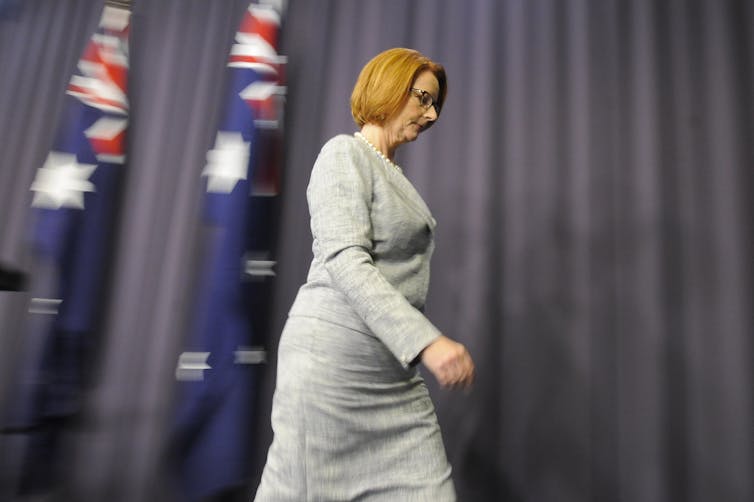There's a big problem with the Murdoch media no one is talking about — how it treats women leaders
- Written by Blair Williams, Associate Lecturer, School of Political Science and International Relations, Australian National University
Rupert Murdoch’s News Corp has long dominated the Australian media landscape, wielding great political and cultural influence.
Former prime minister Kevin Rudd’s record-breaking petition calling for a royal commission into Australian media ownership has once again put this issue in the spotlight. It has gained more than 500,000 signatures and led to a Senate inquiry into media diversity.
Read more: Paper chase: why Kevin Rudd's call for a royal commission into News Corp may lead nowhere
Rudd has described News Corp as a “cancer on democracy”, while fellow former Prime Minister Malcolm Turnbull has labelled it “pure propaganda,” and slammed its “campaign on climate denial”. Labor’s Julia Gillard, has also made similar claims.
However, these discussions fail to consider how the Murdoch press is particularly hostile towards women politicians.
How does the Murdoch press represent women?
While studying media representations of women in politics, I’ve noticed a stark difference in Murdoch press coverage of men and women leaders.
 There is a difference in the way male and female leaders are represented in News Corp papers.
Lukas Coch/AAP
There is a difference in the way male and female leaders are represented in News Corp papers.
Lukas Coch/AAP
My research, recently published in Feminist Media Studies, compared Australian media portrayals of Gillard’s prime ministerial rise with that of Helen Clark’s in New Zealand. Both leaders experienced a sexist focus on their gender, appearance and personal lives. But it was far more frequent and intense for Gillard.
My research suggests two key explanations for this contrast: the different political contexts they operated in, and the dominating influence of the Murdoch press in Australia versus its absence in New Zealand.
As Rudd has argued, the Murdoch press is hyper-partisan and ideologically driven, “blending editorial opinion with news reporting”. News Corp is also known to reward Murdoch’s allies, while damaging his enemies.
Yet this has notably gendered ramifications. Murdoch’s conservative morality, traditionalist values, and opposition to left-wing movements appear constantly in his newspapers, making them uniquely hostile to women.
Read more: Courting the chameleon: how the US election reveals Rupert Murdoch's political colours
Gillard did not simply threaten the political status quo as Australia’s first woman prime minister. As an unmarried, child-free, atheist woman from the left of the ALP, she also threatened Murdoch’s conservative ideology. His newspaper therefore portrayed Gillard in a highly gendered — even misogynistic — manner intended to undermine her. This was evident in the criticisms of her fashion choices, such as a headline condemning her “technicolour screamcoat” in The Daily Telegraph.
Things have not changed since Gillard’s days
Though it’s been ten years since Gillard became prime minister, not much has changed. News Corp papers continue to attack women in politics, especially if they are from the left.
Queensland Labor Premier Annastacia is another seasoned veteran of News Corps’ sexist coverage. This includes the Sunshine Coast Daily’s 2019 front page image, which featured Palaszczuk in crosshairs with the headline, “Anna, you’re next”.
More recently, The Courier Mail labelled her dealings with Liberal NSW Premier Gladys Berejiklian over border closures, “schoolgirl behaviour”.
Even Liberal women aren’t immune from sexist coverage. Julie Bishop, the Coalition’s former foreign affairs minister, was likened to the power-hungry “Lady Macbeth” by The Australian for her 2018 leadership tilt. She was also ridiculed by the same paper for calling out the Liberal party’s sexist bullying culture.
Berejiklian has also endured sexist reportage, particularly during the recent scandal over her relationship with disgraced former NSW MP Daryl Maguire. One Daily Telegraph article waxed lyrical about her supposed “wedding fantasy”, a “feminine albeit old-fashioned thing to do” which, they argued, might have kept a workaholic like Berejiiklian “sane”.
However, the News Corp’s partisan bias towards the Coalition is also evident in these stories. Rather than holding Berejiklian to account, the Murdoch press largely ran sympathetic stories about the premier’s behaviour. This starkly contrasts with the onslaught of sexist coverage Gillard received during the AWU affair, which haunted her for the rest of her term in office.
International leaders also under attack
Australian women aren’t the only targets. The globally popular New Zealand Prime Minister Jacinda Ardern has frequently borne the brunt of biased News Corp coverage.
In the lead up to the 2020 New Zealand election, columnist Greg Sheridan argued Ardern doesn’t live up to the hype, claiming in The Australian,
part of the international Jacindamania comes from the fact she is a young left-wing woman who gave birth in office and took maternity leave.
Sheridan also labelled her government’s COVID-19 response and progressive style of politics as “inherently authoritarian” that also “enjoys bossing people around”.
When Ardern won the election in a historic landslide, The Australian responded with a piece describing her as “grossly incompetent” and “the worst person to lead New Zealand through this economic turbulence”.
Notably, the clear bias here drew criticism from the New Zealand press.
In August, Johannes Leak’s cartoon in The Australian, also received international condemnation for its misogynistic and racist depiction of vice-presidential nominee Kamala Harris.
Don’t forget gender
It is clear the Murdoch press has a “woman problem”.
This poses a real obstacle for women in politics, especially those who oppose Murdoch’s conservative ideology. But it also broadcasts a message about women’s roles and place in society more generally — that no matter how privileged or powerful a woman might be, it’s nearly impossible to escape sexist commentary and the objectifying male gaze.
This is why it is so essential to hold the Murdoch press to account in a specifically gendered light.
Authors: Blair Williams, Associate Lecturer, School of Political Science and International Relations, Australian National University





